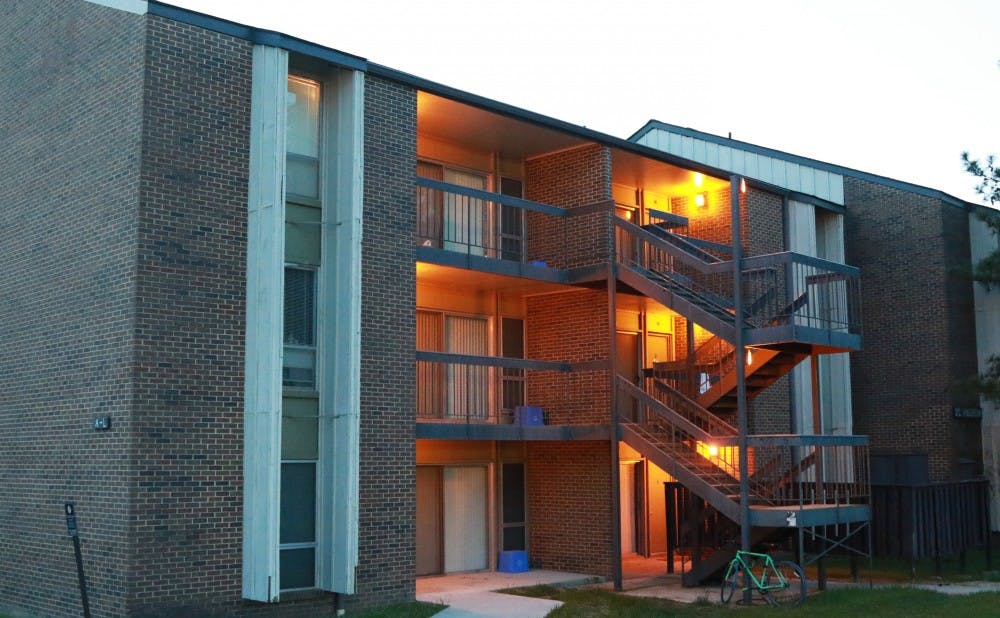How would you react if someone walked into your bedroom unannounced while you were getting dressed? Some Central Campus residents have had to figure out the hard way.
In a March 22 post on the Fix My Campus Facebook page, sophomore Kathryn Mueller asked whether the maintenance staff could be told to knock on students’ doors before entering apartments. Multiple students commented on the post, reporting being walked-in on without a warning.
“Me and a few other friends who live on Central have just had people unlock our doors and walk in unannounced,” Mueller wrote in the post. “It’s an invasion of privacy/personal space and kind of scary to have people who aren’t your roommates just walk into your apartment unexpected.”
Mueller told The Chronicle that the situation happened to her in December, but that she wrote the Facebook post after her friend experienced a similar incident earlier that day.
“[The maintenance staff] just opened her bedroom door, and she was naked,” Mueller said. “It was kind of horrifying for her because she didn't expect three 50-year-old men to be walking into her room unannounced.”
Such intrusions are “common,” Mueller said, adding that four other students wrote comments on her Facebook post relaying similar experiences. Mueller’s post received more than 100 Facebook likes and reactions. She offered a relatively simple suggestion to remedy the situation, saying that staff should knock on doors and give the residents some time to open the door.
Andy Beville, director of facilities operations for Housing, Dining and Residence Life, said these incidents were "absolutely not" in accordance with protocol.
“Is it possible? Sure. But that’s not how we operate,” he said. “My maintenance staff are very conscious, very sensitive to the fact that they're walking into people's homes, and the protocol is that they knock twice, oftentimes three times, as loudly as they can.”
Despite the protocol, Mueller said students sometimes did not hear any knocks on their doors. In some cases, the staff “walked into [students’] bedrooms, not even just their apartment in general." Recounting her own experience, Mueller said she had been sitting on her couch when she heard someone “struggling” to unlock the door as if they were trying to “break in.”
“They didn't knock, they just unlocked my door and then they walked in,” she said. “I was studying for my final later that day, and I just felt like it was kind of inappropriate for them to not warn me about that.”
Students should receive an email notification one to two days in advance of maintenance staff entering an apartment, Beville explained. During the past three months, he said there have been errors in communication leading to incidents like the ones Mueller cited. He added that his staff is working to find new ways to communicate with students, such as through text messages or social media.
“Emails, a couple of years ago, were a wonderful way to get students to respond and recognize that they're receiving a message, but now it may not be the communication pathway that they would use most often,” he said.
HDRL staff have been especially active on Central Campus in the past three months, Beville noted. They have been performing checkups such as indoor air quality tests and fire inspections, and he suggested that this may have contributed to the increase in complaints.
Normally, Beville said, staff should only enter an apartment without email warning in cases of urgent facilities system issues—such as a malfunctioning chilled water supply or water leakages.
“If we have a hot water heater explode on us, which happens often, and it leaks into adjacent apartments, then we have to respond immediately because of the damage that can be caused by water,” he said.
Junior Adriana Santomero wrote in a comment on the Facebook post that although she had contacted HDRL after a similar incident, apparently “nothing has changed.”
Without any changes, Mueller said students feel “discomfort and annoyance” at HDRL’s handling of the situation.
“We pay a lot of money to live where we do, and I feel like my apartment is somewhere I want to feel safe, and it just makes me feel uncomfortable when you hear about this,” she said.
Get The Chronicle straight to your inbox
Sign up for our weekly newsletter. Cancel at any time.

